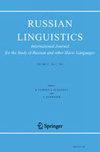它的长和短:俄语谓语形容词与零连词
IF 0.8
3区 文学
0 LANGUAGE & LINGUISTICS
引用次数: 1
摘要
摘要本文基于俄语国家语料库句法子语料库的数据,对俄语谓语形容词的长(如prostoj“简单”)和短(如prostoj“简单”)形式的选择进行了实证研究。仔细研究的数据表明,缩略形式代表了谓语形容词的主要选择。长形式是在句子中不加补语的对主位参与者的描述,而短形式可以加补语,同时描述主位参与者(主位和修辞)和情境。在“竞争空间”中,长形式和短形式都得到了很好的证明,有人认为,形式的选择在某种程度上取决于主体类型、性别/数量和频率。在方法层面上,本研究采用的方法可以扩展到形态句法竞争的其他情况。有人建议,在对“竞争空间”进行统计分析之前,应该首先“剥离”(近乎)绝对规则起作用的上下文。本文章由计算机程序翻译,如有差异,请以英文原文为准。

The long and the short of it: Russian predicate adjectives with zero copula
Abstract The present article presents an empirical investigation of the choice between so-called long (e.g., prostoj ‘simple’) and short (e.g., prost ‘simple’) forms of predicate adjectives in Russian, based on data from the syntactic subcorpus of the Russian National Corpus. The data under scrutiny suggest that short forms represent the dominant option for predicate adjectives. It is proposed that long forms are descriptions of thematic participants in sentences with no complement, while short forms may take complements and describe both participants (thematic and rhematic) and situations. Within the “space of competition” where both long and short forms are well attested, it is argued that the choice of form to some extent depends on subject type, gender/number, and frequency. On the methodological level, the approach adopted in the present study may be extended to other cases of competition in morphosyntax. It is suggested that one should first “peel off” contexts where (nearly) categorical rules are at work, before one undertakes a statistical analysis of the “space of competition”.
求助全文
通过发布文献求助,成功后即可免费获取论文全文。
去求助
来源期刊

RUSSIAN LINGUISTICS
LANGUAGE & LINGUISTICS-
CiteScore
1.20
自引率
0.00%
发文量
21
期刊介绍:
Russian Linguistics is a peer-reviewed journal devoted to the empirical and theoretical study of Russian and other Slavic languages in all their diversity. It is open to all areas of linguistics, welcoming empirical, theoretical and applied approaches as well as in-depth qualitative and larger-scale quantitative studies from both synchronic and diachronic perspectives.
Russian Linguistics publishes three types of articles: 1) original articles as full reports of data from own research, 2) reviews of recent research (not older than 2 years), 3) squibs as shorter contributions initiating discussions relevant within their field and to the specific question they address.
The journal invites submissions written in English or Russian. It is recommended to write in English in order to facilitate a wider outreach in the linguistic community.
 求助内容:
求助内容: 应助结果提醒方式:
应助结果提醒方式:


